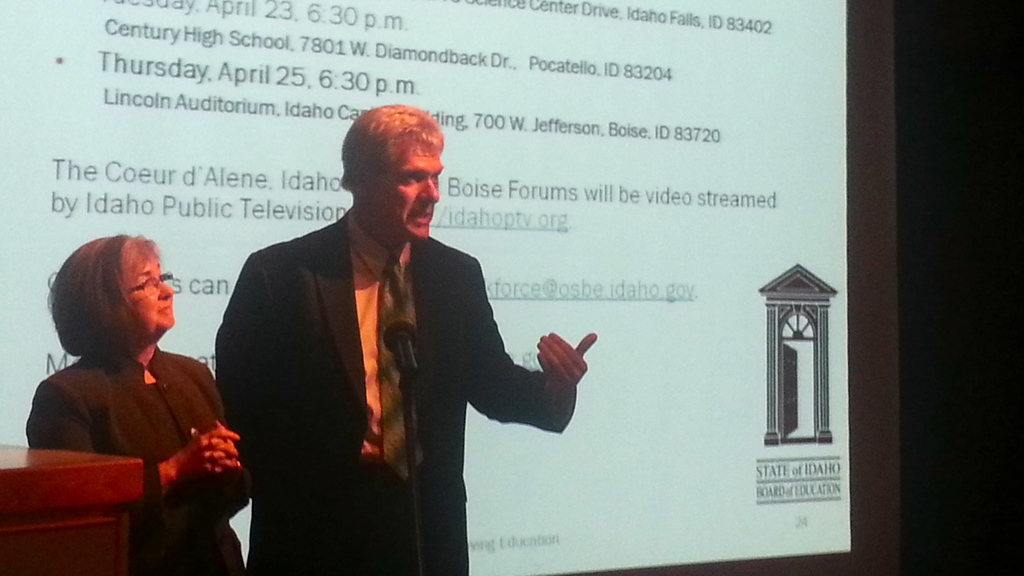The new Common Core state standards became a theme even before Monday’s education task force meeting in Idaho Falls began.
Residents arriving early unofficially surveyed members of the crowd to learn their views on the new math and English language arts standards that will be taught for the first time next school year.
And one woman distributed fliers outlining talking points for those opposing the standards.
Once the meeting began, a near-capacity crowd crammed into a 260-seat auditorium. With an audience of more than 200, the testimony from the 31 speakers was predictably varied. Even so, funding and the new state standards were dominant themes.
All told, 10 residents spoke out against the Common Core standards, while three people offered their support.
Erica Harris, who teaches seventh- and eighth-graders at Sugar-Salem Junior High School, said she loves the new state standards because they narrow the educational focus and allow teachers to go so much deeper with their subject material.
“The standards may seem like they are more difficult, and they should be,” Harris said. “We are teaching our kids to analyze, to come to conclusions and to apply those conclusions (because) that is what we have to do as adults.”

Harris did say she and other teachers are nervous about the Smarter Balanced Assessment performance tests that will first be given in 2014-15 – the year after the standards are first taught.
“We don’t know what it is going to look like,” Harris said. “If we have some preparation, my faculty specifically will be more comfortable teaching and preparing students for this test.”
Meanwhile, more people who spoke about Common Core voiced concerns or opposition. Many complained of excessive government involvement, or said there should be less emphasis on testing or comparing Idaho children to children elsewhere.
Others opposed the increased emphasis on nonfiction tests, saying classic works of fiction could fall by the wayside.
Maria Nate, a mother of four from Rexburg, complained about testing associated with the new standards. She also said the data collected under the new standards threatens students’ privacy.
By the numbers, who attended:
Four education task force members: chairman and State Board of Education member Richard Westerberg, state schools superintendent Tom Luna, Geoffrey Thomas and Teresa Jackman.
Seven lawmakers: Sen. Brent Hill and Reps. Jeff Thompson, Linden Bateman,Wendy Horman, Janet Trujillo, Dell Raybould and Julie VanOrden.
Two former lawmakers: former Reps. Jerry Shively and Dennis Lake.
State Board of Education member Emma Atchley.
School board members, current and retired teachers, parents, administrators and taxpayers.
“I think we need to get out of it,” Nate said, earning an enthusiastic ovation and whistles of approval from the crowd.
Don Schanz, the former chairman of the Bonneville County Republican Central Committee, also opposed the standards. Schanz earned applause when he called for greater school choice and expressed concerns parents would be less involved under the new standards.
But Schanz was one of three speakers who incorrectly repeated a myth that the decision on the standards was made quietly and without a public vote.
Schanz specifically claimed, “There was no input from the Idaho Legislature.”
However, in January 2011 the Legislature’s Senate Education Committee voted unanimously to approve the standards. The Idaho State Board of Education also voted to adopt them.
The other main theme was funding. Nobody specifically answered task force chairman Richard Westerberg’s question about the proper and correct amount of funding for education, several residents voiced concerns.
“The problem that we have is that an equal education is not possible when districts are completely dependent on their district’s ability to pass a levy,” Rigby English teacher Julie Strickland said. “I’m sorry, but that costs money, and it costs equal money across the (state), not just in Idaho Falls, and not just in Boise and not just in the larger cities of this state.”
Additionally, three residents said they would gladly pay higher taxes if they could be assured the money would be directed specifically to public schools. Citing cuts to music and arts programs and the Idaho Falls School District’s upcoming budget cuts, Idaho Falls resident Alice Pike said she is worried her 14-year-old daughter won’t receive the same qualify of education that her older sisters did.
“I’m willing to pay more if that is what is necessary,” Pike said. “I don’t think Idaho wants to be in a race to the bottom.”
Moments later, Pike’s daughter, Elizabeth Joy Krell, took the podium to say she encouraged her mother to bring her to the forum.
“I don’t know much about the state and funding, and I don’t know the statistics,” Elizabeth said. “But I do know how it’s hurting the schools because I am inside of them.”
At 6:30 p.m. Thursday, the task force will reconvene at the Statehouse in Boise for an additional public forum and to begin making sense of the public comment gleaned from the six meetings held outside of Boise.
Check back with Idaho Ed News later in the week for full overage of Tuesday and Thursday’s meetings.
